Corporate Law Analysis: ASIC v Adler (2002) Case and Director Duties
VerifiedAdded on 2022/11/28
|11
|2458
|2
Essay
AI Summary
This essay provides a comprehensive analysis of the ASIC v Adler (2002) case, focusing on corporate law principles and director duties. The essay examines the key individuals involved, including Rodney Adler, Ray Williams, and Dominic Fodera, and outlines the breaches of duty under the Corporations Act 2001. It delves into the specifics of the transactions, such as the unsecured loan to Pacific Eagle Equity (PEE) and the subsequent purchase and sale of HIH shares, highlighting how these actions violated sections 180-183 of the Act. The essay details the penalties imposed on the directors, including disqualification and pecuniary penalties, and discusses the actions that should have been taken to prevent insolvency. Furthermore, it explores the involvement of the Australian Securities and Investments Commission (ASIC) and the lessons learned from the case regarding compliance with director duties and the consequences of financial misconduct. The essay concludes by emphasizing the importance of understanding director responsibilities and the significance of ethical corporate governance.
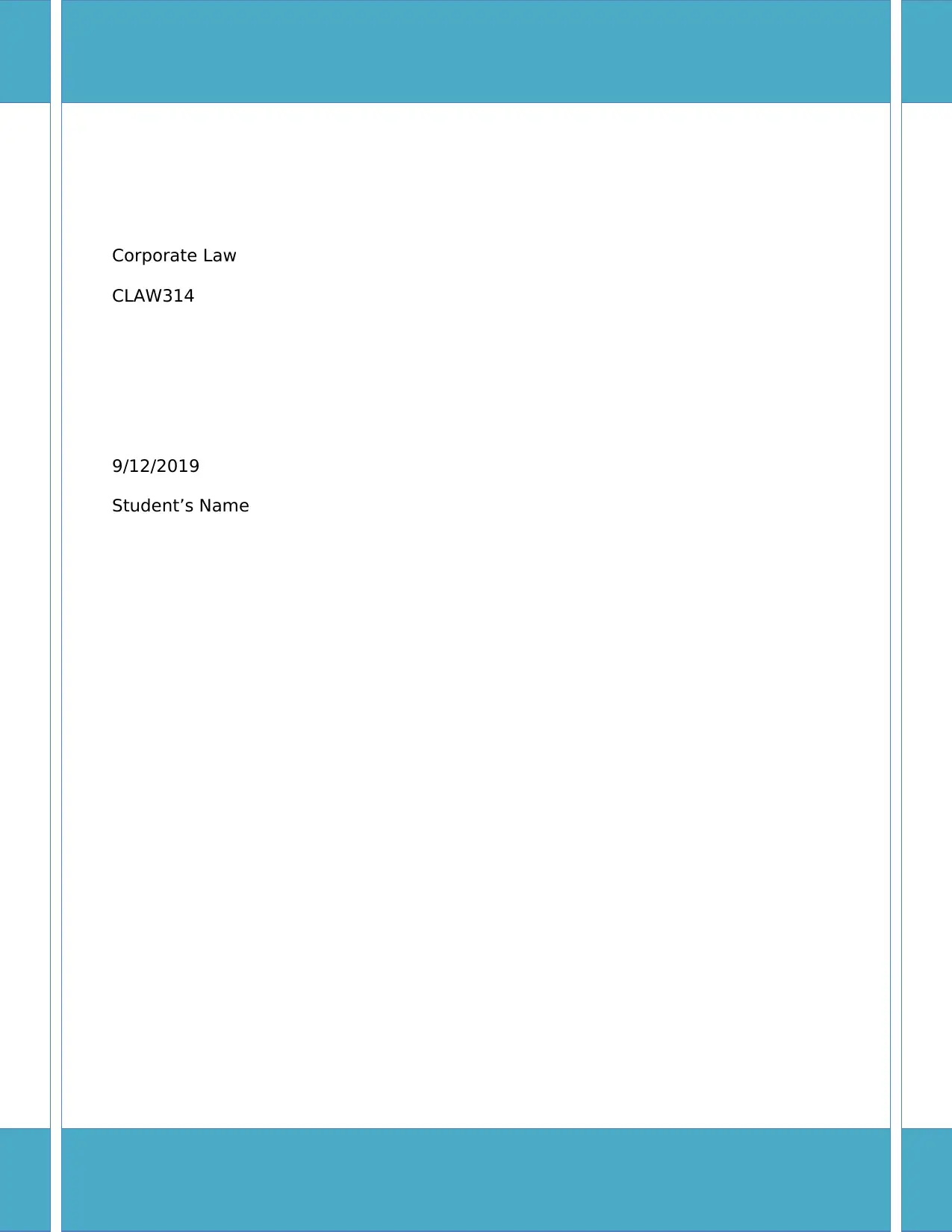
Running Head: BUSINESS AND CORPORATION LAW
0
Corporate Law
CLAW314
9/12/2019
Student’s Name
0
Corporate Law
CLAW314
9/12/2019
Student’s Name
Paraphrase This Document
Need a fresh take? Get an instant paraphrase of this document with our AI Paraphraser
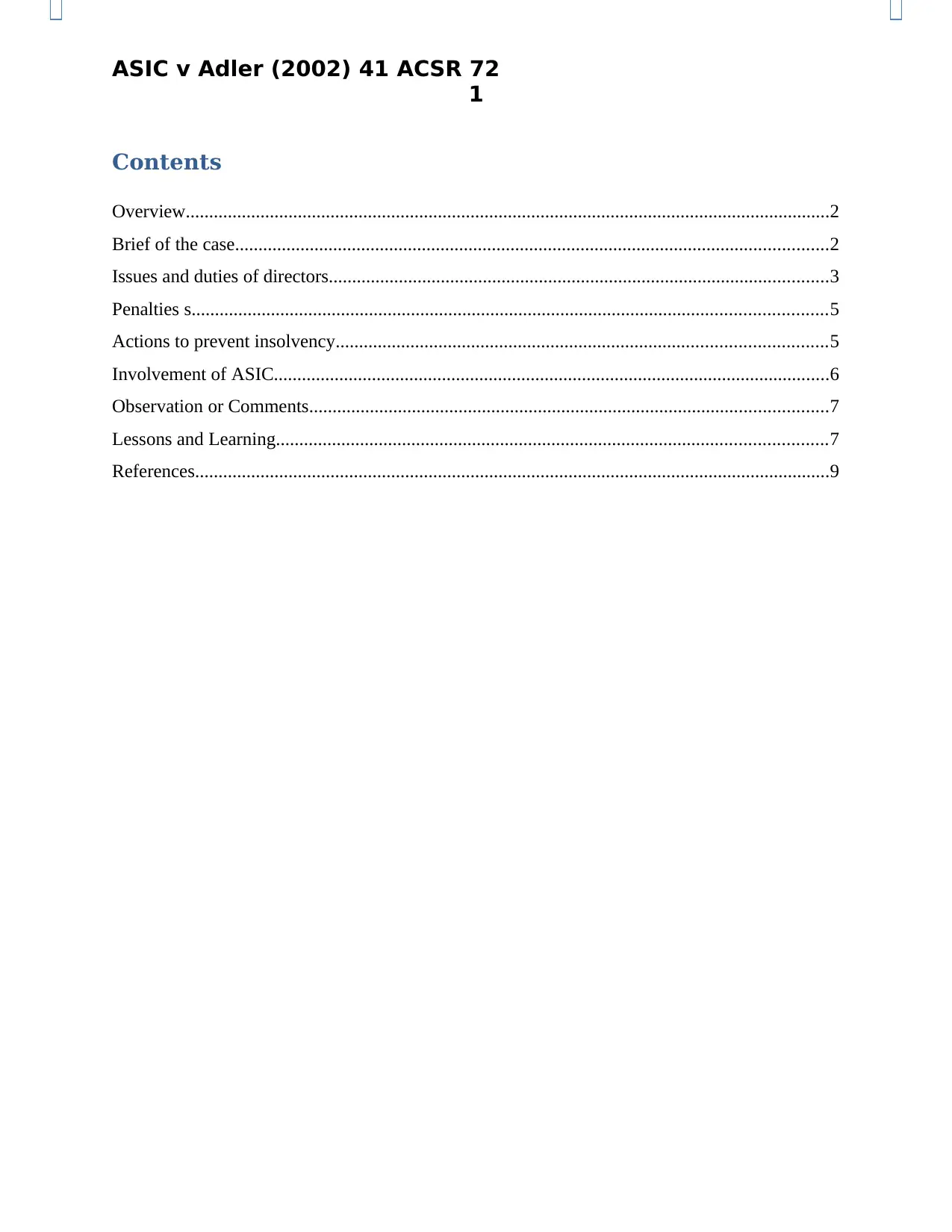
ASIC v Adler (2002) 41 ACSR 72
1
Contents
Overview..........................................................................................................................................2
Brief of the case...............................................................................................................................2
Issues and duties of directors...........................................................................................................3
Penalties s........................................................................................................................................5
Actions to prevent insolvency.........................................................................................................5
Involvement of ASIC.......................................................................................................................6
Observation or Comments...............................................................................................................7
Lessons and Learning......................................................................................................................7
References........................................................................................................................................9
1
Contents
Overview..........................................................................................................................................2
Brief of the case...............................................................................................................................2
Issues and duties of directors...........................................................................................................3
Penalties s........................................................................................................................................5
Actions to prevent insolvency.........................................................................................................5
Involvement of ASIC.......................................................................................................................6
Observation or Comments...............................................................................................................7
Lessons and Learning......................................................................................................................7
References........................................................................................................................................9
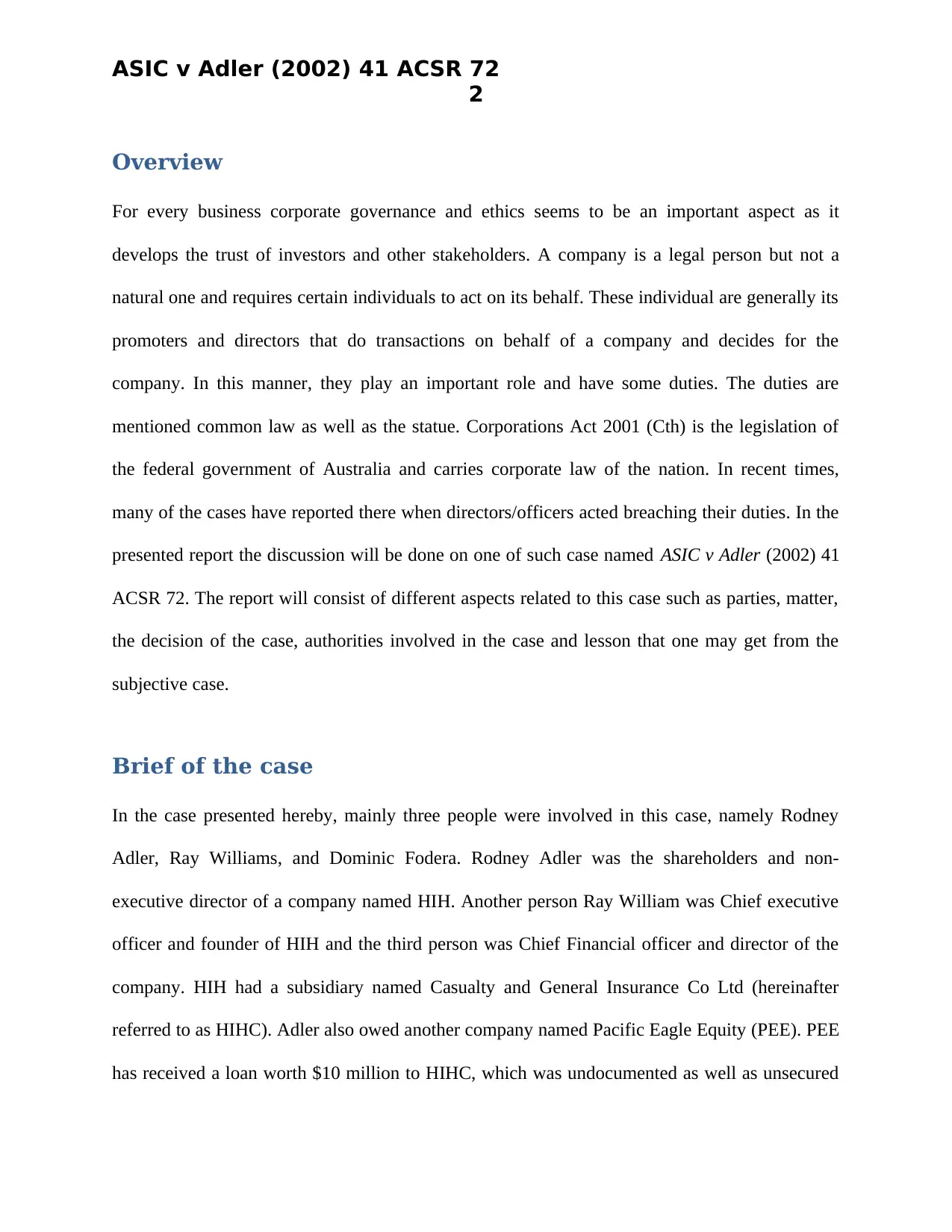
ASIC v Adler (2002) 41 ACSR 72
2
Overview
For every business corporate governance and ethics seems to be an important aspect as it
develops the trust of investors and other stakeholders. A company is a legal person but not a
natural one and requires certain individuals to act on its behalf. These individual are generally its
promoters and directors that do transactions on behalf of a company and decides for the
company. In this manner, they play an important role and have some duties. The duties are
mentioned common law as well as the statue. Corporations Act 2001 (Cth) is the legislation of
the federal government of Australia and carries corporate law of the nation. In recent times,
many of the cases have reported there when directors/officers acted breaching their duties. In the
presented report the discussion will be done on one of such case named ASIC v Adler (2002) 41
ACSR 72. The report will consist of different aspects related to this case such as parties, matter,
the decision of the case, authorities involved in the case and lesson that one may get from the
subjective case.
Brief of the case
In the case presented hereby, mainly three people were involved in this case, namely Rodney
Adler, Ray Williams, and Dominic Fodera. Rodney Adler was the shareholders and non-
executive director of a company named HIH. Another person Ray William was Chief executive
officer and founder of HIH and the third person was Chief Financial officer and director of the
company. HIH had a subsidiary named Casualty and General Insurance Co Ltd (hereinafter
referred to as HIHC). Adler also owed another company named Pacific Eagle Equity (PEE). PEE
has received a loan worth $10 million to HIHC, which was undocumented as well as unsecured
2
Overview
For every business corporate governance and ethics seems to be an important aspect as it
develops the trust of investors and other stakeholders. A company is a legal person but not a
natural one and requires certain individuals to act on its behalf. These individual are generally its
promoters and directors that do transactions on behalf of a company and decides for the
company. In this manner, they play an important role and have some duties. The duties are
mentioned common law as well as the statue. Corporations Act 2001 (Cth) is the legislation of
the federal government of Australia and carries corporate law of the nation. In recent times,
many of the cases have reported there when directors/officers acted breaching their duties. In the
presented report the discussion will be done on one of such case named ASIC v Adler (2002) 41
ACSR 72. The report will consist of different aspects related to this case such as parties, matter,
the decision of the case, authorities involved in the case and lesson that one may get from the
subjective case.
Brief of the case
In the case presented hereby, mainly three people were involved in this case, namely Rodney
Adler, Ray Williams, and Dominic Fodera. Rodney Adler was the shareholders and non-
executive director of a company named HIH. Another person Ray William was Chief executive
officer and founder of HIH and the third person was Chief Financial officer and director of the
company. HIH had a subsidiary named Casualty and General Insurance Co Ltd (hereinafter
referred to as HIHC). Adler also owed another company named Pacific Eagle Equity (PEE). PEE
has received a loan worth $10 million to HIHC, which was undocumented as well as unsecured
⊘ This is a preview!⊘
Do you want full access?
Subscribe today to unlock all pages.

Trusted by 1+ million students worldwide
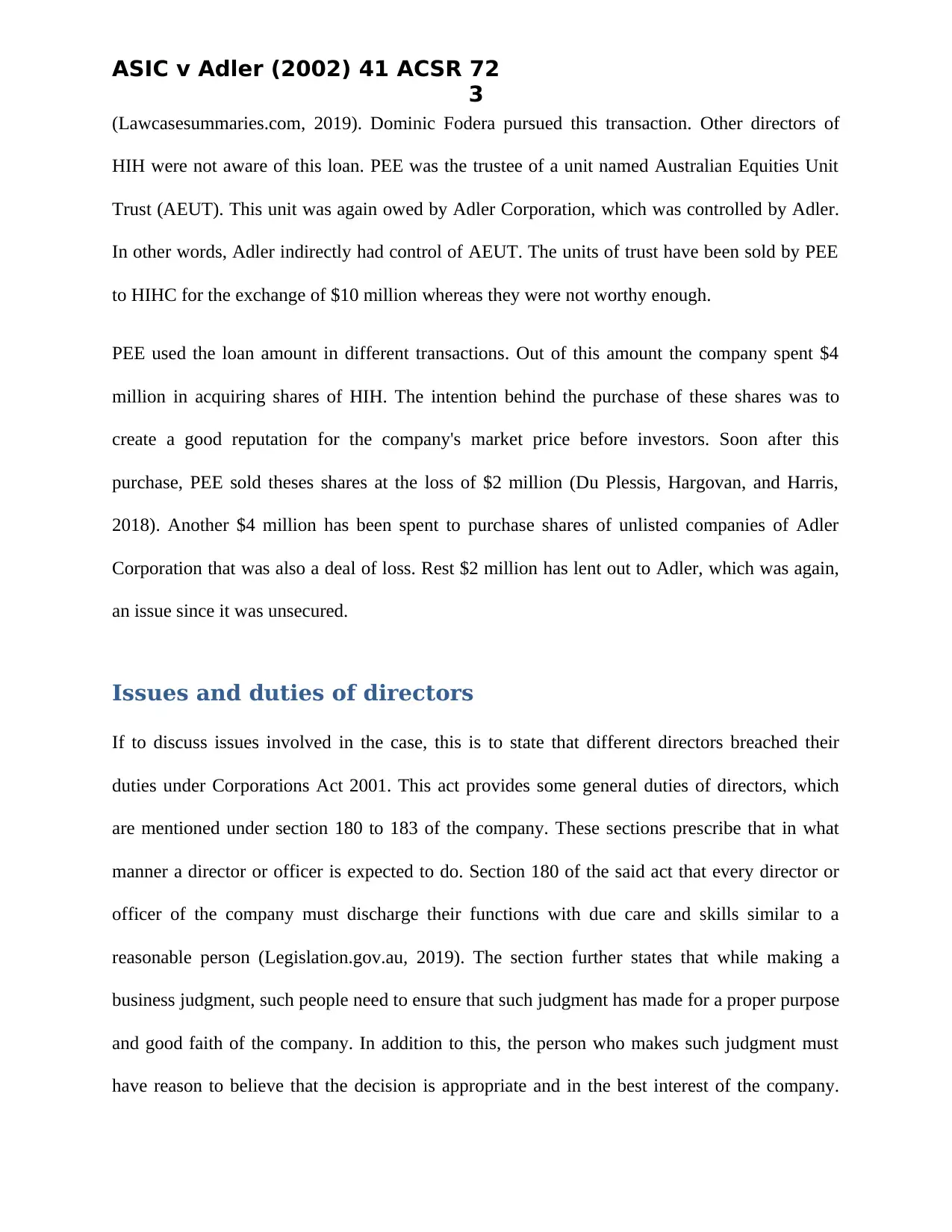
ASIC v Adler (2002) 41 ACSR 72
3
(Lawcasesummaries.com, 2019). Dominic Fodera pursued this transaction. Other directors of
HIH were not aware of this loan. PEE was the trustee of a unit named Australian Equities Unit
Trust (AEUT). This unit was again owed by Adler Corporation, which was controlled by Adler.
In other words, Adler indirectly had control of AEUT. The units of trust have been sold by PEE
to HIHC for the exchange of $10 million whereas they were not worthy enough.
PEE used the loan amount in different transactions. Out of this amount the company spent $4
million in acquiring shares of HIH. The intention behind the purchase of these shares was to
create a good reputation for the company's market price before investors. Soon after this
purchase, PEE sold theses shares at the loss of $2 million (Du Plessis, Hargovan, and Harris,
2018). Another $4 million has been spent to purchase shares of unlisted companies of Adler
Corporation that was also a deal of loss. Rest $2 million has lent out to Adler, which was again,
an issue since it was unsecured.
Issues and duties of directors
If to discuss issues involved in the case, this is to state that different directors breached their
duties under Corporations Act 2001. This act provides some general duties of directors, which
are mentioned under section 180 to 183 of the company. These sections prescribe that in what
manner a director or officer is expected to do. Section 180 of the said act that every director or
officer of the company must discharge their functions with due care and skills similar to a
reasonable person (Legislation.gov.au, 2019). The section further states that while making a
business judgment, such people need to ensure that such judgment has made for a proper purpose
and good faith of the company. In addition to this, the person who makes such judgment must
have reason to believe that the decision is appropriate and in the best interest of the company.
3
(Lawcasesummaries.com, 2019). Dominic Fodera pursued this transaction. Other directors of
HIH were not aware of this loan. PEE was the trustee of a unit named Australian Equities Unit
Trust (AEUT). This unit was again owed by Adler Corporation, which was controlled by Adler.
In other words, Adler indirectly had control of AEUT. The units of trust have been sold by PEE
to HIHC for the exchange of $10 million whereas they were not worthy enough.
PEE used the loan amount in different transactions. Out of this amount the company spent $4
million in acquiring shares of HIH. The intention behind the purchase of these shares was to
create a good reputation for the company's market price before investors. Soon after this
purchase, PEE sold theses shares at the loss of $2 million (Du Plessis, Hargovan, and Harris,
2018). Another $4 million has been spent to purchase shares of unlisted companies of Adler
Corporation that was also a deal of loss. Rest $2 million has lent out to Adler, which was again,
an issue since it was unsecured.
Issues and duties of directors
If to discuss issues involved in the case, this is to state that different directors breached their
duties under Corporations Act 2001. This act provides some general duties of directors, which
are mentioned under section 180 to 183 of the company. These sections prescribe that in what
manner a director or officer is expected to do. Section 180 of the said act that every director or
officer of the company must discharge their functions with due care and skills similar to a
reasonable person (Legislation.gov.au, 2019). The section further states that while making a
business judgment, such people need to ensure that such judgment has made for a proper purpose
and good faith of the company. In addition to this, the person who makes such judgment must
have reason to believe that the decision is appropriate and in the best interest of the company.
Paraphrase This Document
Need a fresh take? Get an instant paraphrase of this document with our AI Paraphraser
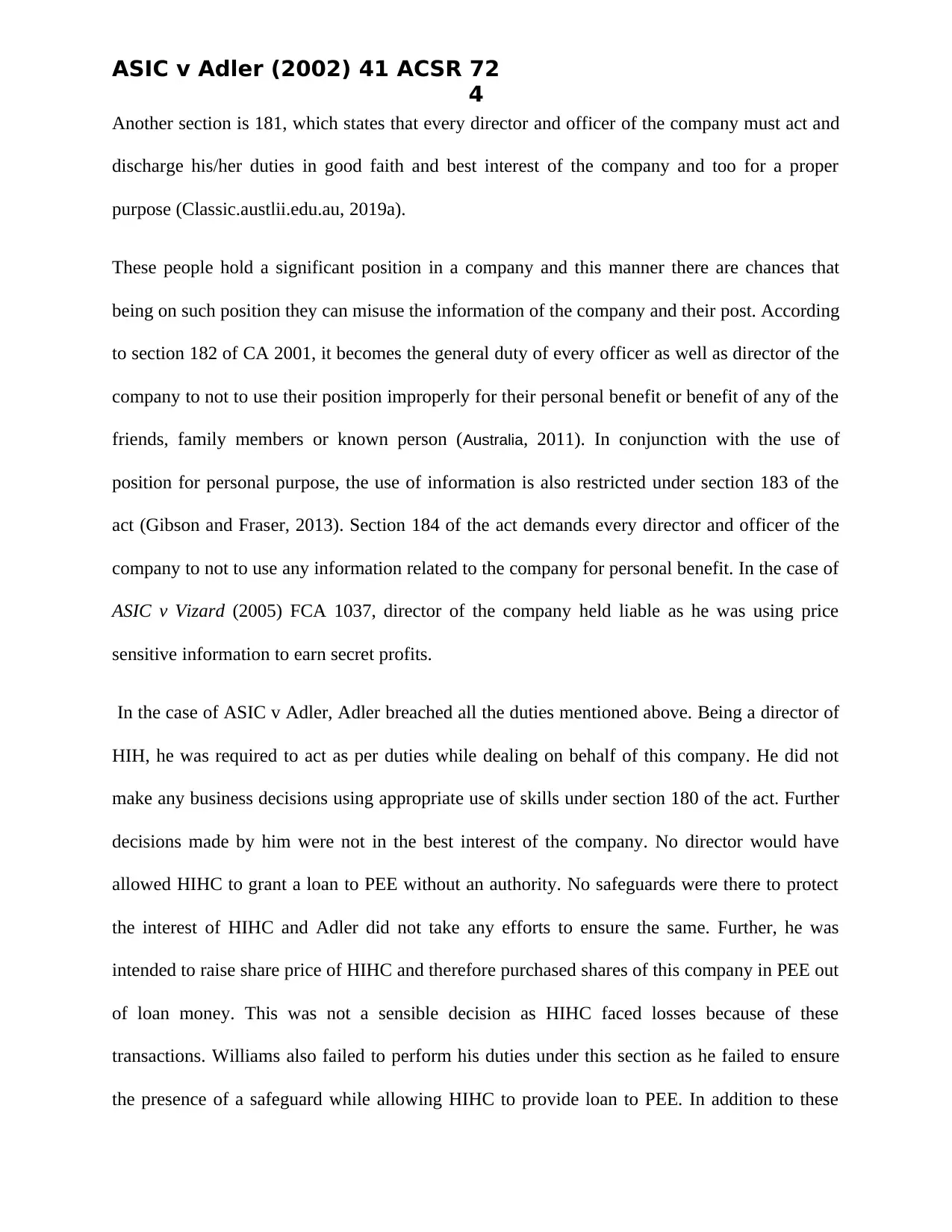
ASIC v Adler (2002) 41 ACSR 72
4
Another section is 181, which states that every director and officer of the company must act and
discharge his/her duties in good faith and best interest of the company and too for a proper
purpose (Classic.austlii.edu.au, 2019a).
These people hold a significant position in a company and this manner there are chances that
being on such position they can misuse the information of the company and their post. According
to section 182 of CA 2001, it becomes the general duty of every officer as well as director of the
company to not to use their position improperly for their personal benefit or benefit of any of the
friends, family members or known person (Australia, 2011). In conjunction with the use of
position for personal purpose, the use of information is also restricted under section 183 of the
act (Gibson and Fraser, 2013). Section 184 of the act demands every director and officer of the
company to not to use any information related to the company for personal benefit. In the case of
ASIC v Vizard (2005) FCA 1037, director of the company held liable as he was using price
sensitive information to earn secret profits.
In the case of ASIC v Adler, Adler breached all the duties mentioned above. Being a director of
HIH, he was required to act as per duties while dealing on behalf of this company. He did not
make any business decisions using appropriate use of skills under section 180 of the act. Further
decisions made by him were not in the best interest of the company. No director would have
allowed HIHC to grant a loan to PEE without an authority. No safeguards were there to protect
the interest of HIHC and Adler did not take any efforts to ensure the same. Further, he was
intended to raise share price of HIHC and therefore purchased shares of this company in PEE out
of loan money. This was not a sensible decision as HIHC faced losses because of these
transactions. Williams also failed to perform his duties under this section as he failed to ensure
the presence of a safeguard while allowing HIHC to provide loan to PEE. In addition to these
4
Another section is 181, which states that every director and officer of the company must act and
discharge his/her duties in good faith and best interest of the company and too for a proper
purpose (Classic.austlii.edu.au, 2019a).
These people hold a significant position in a company and this manner there are chances that
being on such position they can misuse the information of the company and their post. According
to section 182 of CA 2001, it becomes the general duty of every officer as well as director of the
company to not to use their position improperly for their personal benefit or benefit of any of the
friends, family members or known person (Australia, 2011). In conjunction with the use of
position for personal purpose, the use of information is also restricted under section 183 of the
act (Gibson and Fraser, 2013). Section 184 of the act demands every director and officer of the
company to not to use any information related to the company for personal benefit. In the case of
ASIC v Vizard (2005) FCA 1037, director of the company held liable as he was using price
sensitive information to earn secret profits.
In the case of ASIC v Adler, Adler breached all the duties mentioned above. Being a director of
HIH, he was required to act as per duties while dealing on behalf of this company. He did not
make any business decisions using appropriate use of skills under section 180 of the act. Further
decisions made by him were not in the best interest of the company. No director would have
allowed HIHC to grant a loan to PEE without an authority. No safeguards were there to protect
the interest of HIHC and Adler did not take any efforts to ensure the same. Further, he was
intended to raise share price of HIHC and therefore purchased shares of this company in PEE out
of loan money. This was not a sensible decision as HIHC faced losses because of these
transactions. Williams also failed to perform his duties under this section as he failed to ensure
the presence of a safeguard while allowing HIHC to provide loan to PEE. In addition to these
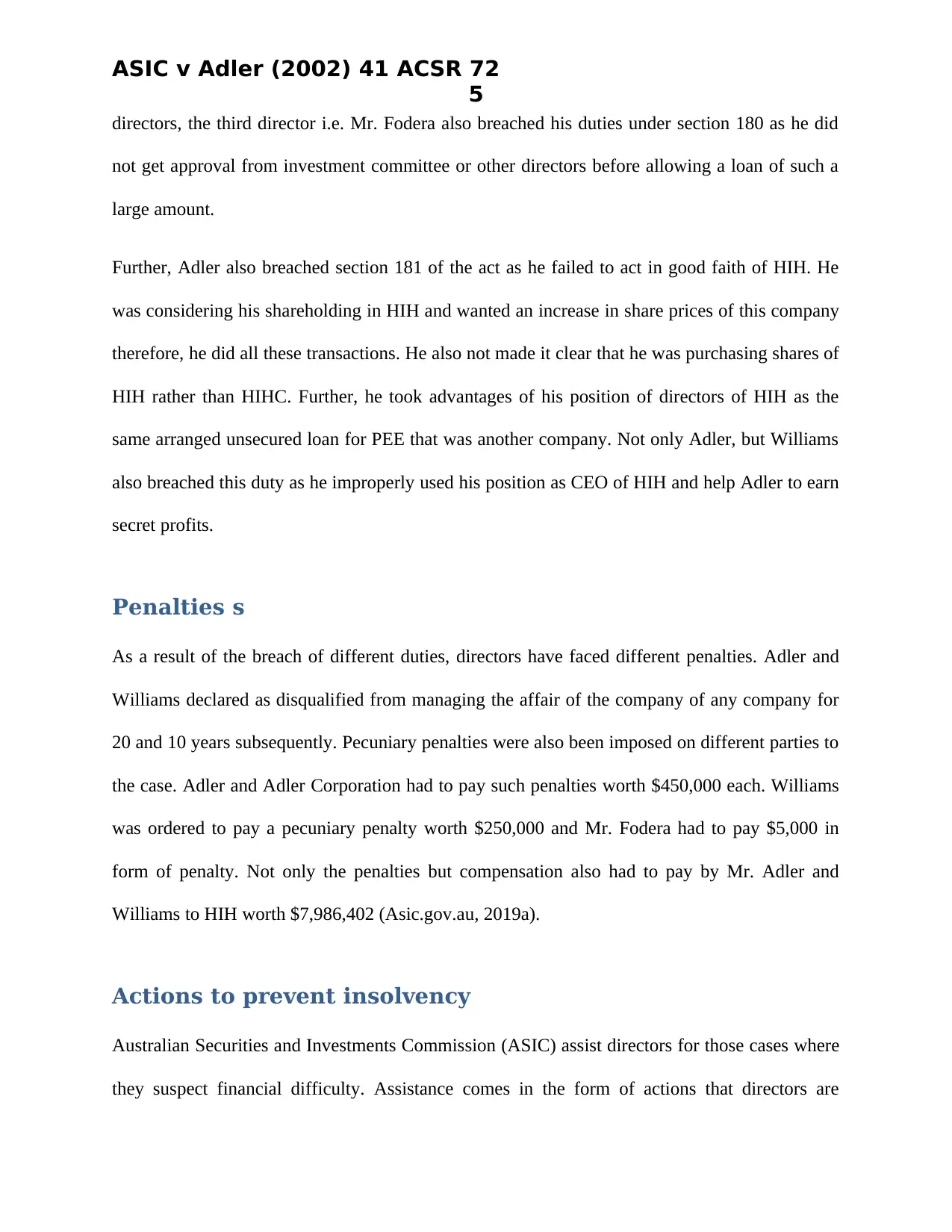
ASIC v Adler (2002) 41 ACSR 72
5
directors, the third director i.e. Mr. Fodera also breached his duties under section 180 as he did
not get approval from investment committee or other directors before allowing a loan of such a
large amount.
Further, Adler also breached section 181 of the act as he failed to act in good faith of HIH. He
was considering his shareholding in HIH and wanted an increase in share prices of this company
therefore, he did all these transactions. He also not made it clear that he was purchasing shares of
HIH rather than HIHC. Further, he took advantages of his position of directors of HIH as the
same arranged unsecured loan for PEE that was another company. Not only Adler, but Williams
also breached this duty as he improperly used his position as CEO of HIH and help Adler to earn
secret profits.
Penalties s
As a result of the breach of different duties, directors have faced different penalties. Adler and
Williams declared as disqualified from managing the affair of the company of any company for
20 and 10 years subsequently. Pecuniary penalties were also been imposed on different parties to
the case. Adler and Adler Corporation had to pay such penalties worth $450,000 each. Williams
was ordered to pay a pecuniary penalty worth $250,000 and Mr. Fodera had to pay $5,000 in
form of penalty. Not only the penalties but compensation also had to pay by Mr. Adler and
Williams to HIH worth $7,986,402 (Asic.gov.au, 2019a).
Actions to prevent insolvency
Australian Securities and Investments Commission (ASIC) assist directors for those cases where
they suspect financial difficulty. Assistance comes in the form of actions that directors are
5
directors, the third director i.e. Mr. Fodera also breached his duties under section 180 as he did
not get approval from investment committee or other directors before allowing a loan of such a
large amount.
Further, Adler also breached section 181 of the act as he failed to act in good faith of HIH. He
was considering his shareholding in HIH and wanted an increase in share prices of this company
therefore, he did all these transactions. He also not made it clear that he was purchasing shares of
HIH rather than HIHC. Further, he took advantages of his position of directors of HIH as the
same arranged unsecured loan for PEE that was another company. Not only Adler, but Williams
also breached this duty as he improperly used his position as CEO of HIH and help Adler to earn
secret profits.
Penalties s
As a result of the breach of different duties, directors have faced different penalties. Adler and
Williams declared as disqualified from managing the affair of the company of any company for
20 and 10 years subsequently. Pecuniary penalties were also been imposed on different parties to
the case. Adler and Adler Corporation had to pay such penalties worth $450,000 each. Williams
was ordered to pay a pecuniary penalty worth $250,000 and Mr. Fodera had to pay $5,000 in
form of penalty. Not only the penalties but compensation also had to pay by Mr. Adler and
Williams to HIH worth $7,986,402 (Asic.gov.au, 2019a).
Actions to prevent insolvency
Australian Securities and Investments Commission (ASIC) assist directors for those cases where
they suspect financial difficulty. Assistance comes in the form of actions that directors are
⊘ This is a preview!⊘
Do you want full access?
Subscribe today to unlock all pages.

Trusted by 1+ million students worldwide
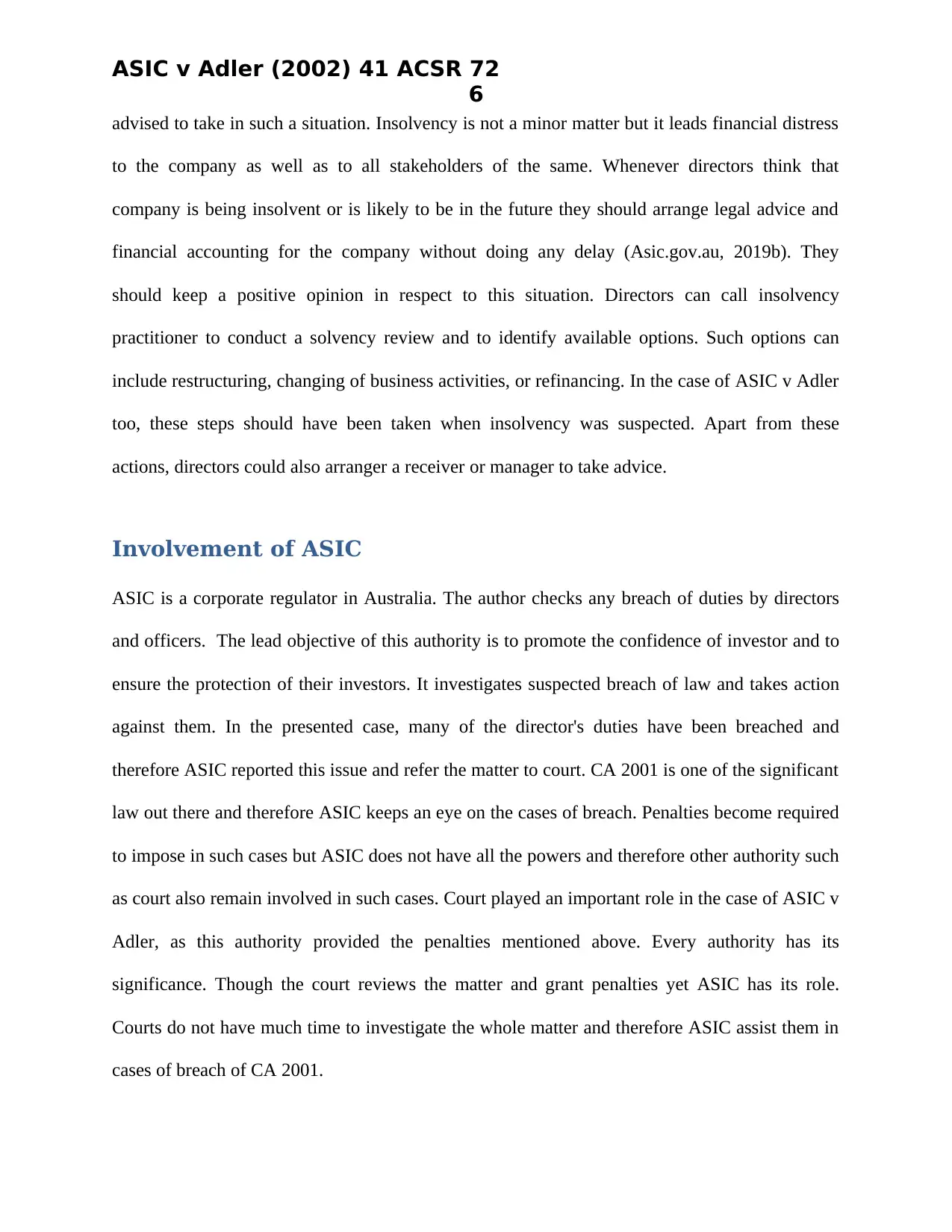
ASIC v Adler (2002) 41 ACSR 72
6
advised to take in such a situation. Insolvency is not a minor matter but it leads financial distress
to the company as well as to all stakeholders of the same. Whenever directors think that
company is being insolvent or is likely to be in the future they should arrange legal advice and
financial accounting for the company without doing any delay (Asic.gov.au, 2019b). They
should keep a positive opinion in respect to this situation. Directors can call insolvency
practitioner to conduct a solvency review and to identify available options. Such options can
include restructuring, changing of business activities, or refinancing. In the case of ASIC v Adler
too, these steps should have been taken when insolvency was suspected. Apart from these
actions, directors could also arranger a receiver or manager to take advice.
Involvement of ASIC
ASIC is a corporate regulator in Australia. The author checks any breach of duties by directors
and officers. The lead objective of this authority is to promote the confidence of investor and to
ensure the protection of their investors. It investigates suspected breach of law and takes action
against them. In the presented case, many of the director's duties have been breached and
therefore ASIC reported this issue and refer the matter to court. CA 2001 is one of the significant
law out there and therefore ASIC keeps an eye on the cases of breach. Penalties become required
to impose in such cases but ASIC does not have all the powers and therefore other authority such
as court also remain involved in such cases. Court played an important role in the case of ASIC v
Adler, as this authority provided the penalties mentioned above. Every authority has its
significance. Though the court reviews the matter and grant penalties yet ASIC has its role.
Courts do not have much time to investigate the whole matter and therefore ASIC assist them in
cases of breach of CA 2001.
6
advised to take in such a situation. Insolvency is not a minor matter but it leads financial distress
to the company as well as to all stakeholders of the same. Whenever directors think that
company is being insolvent or is likely to be in the future they should arrange legal advice and
financial accounting for the company without doing any delay (Asic.gov.au, 2019b). They
should keep a positive opinion in respect to this situation. Directors can call insolvency
practitioner to conduct a solvency review and to identify available options. Such options can
include restructuring, changing of business activities, or refinancing. In the case of ASIC v Adler
too, these steps should have been taken when insolvency was suspected. Apart from these
actions, directors could also arranger a receiver or manager to take advice.
Involvement of ASIC
ASIC is a corporate regulator in Australia. The author checks any breach of duties by directors
and officers. The lead objective of this authority is to promote the confidence of investor and to
ensure the protection of their investors. It investigates suspected breach of law and takes action
against them. In the presented case, many of the director's duties have been breached and
therefore ASIC reported this issue and refer the matter to court. CA 2001 is one of the significant
law out there and therefore ASIC keeps an eye on the cases of breach. Penalties become required
to impose in such cases but ASIC does not have all the powers and therefore other authority such
as court also remain involved in such cases. Court played an important role in the case of ASIC v
Adler, as this authority provided the penalties mentioned above. Every authority has its
significance. Though the court reviews the matter and grant penalties yet ASIC has its role.
Courts do not have much time to investigate the whole matter and therefore ASIC assist them in
cases of breach of CA 2001.
Paraphrase This Document
Need a fresh take? Get an instant paraphrase of this document with our AI Paraphraser
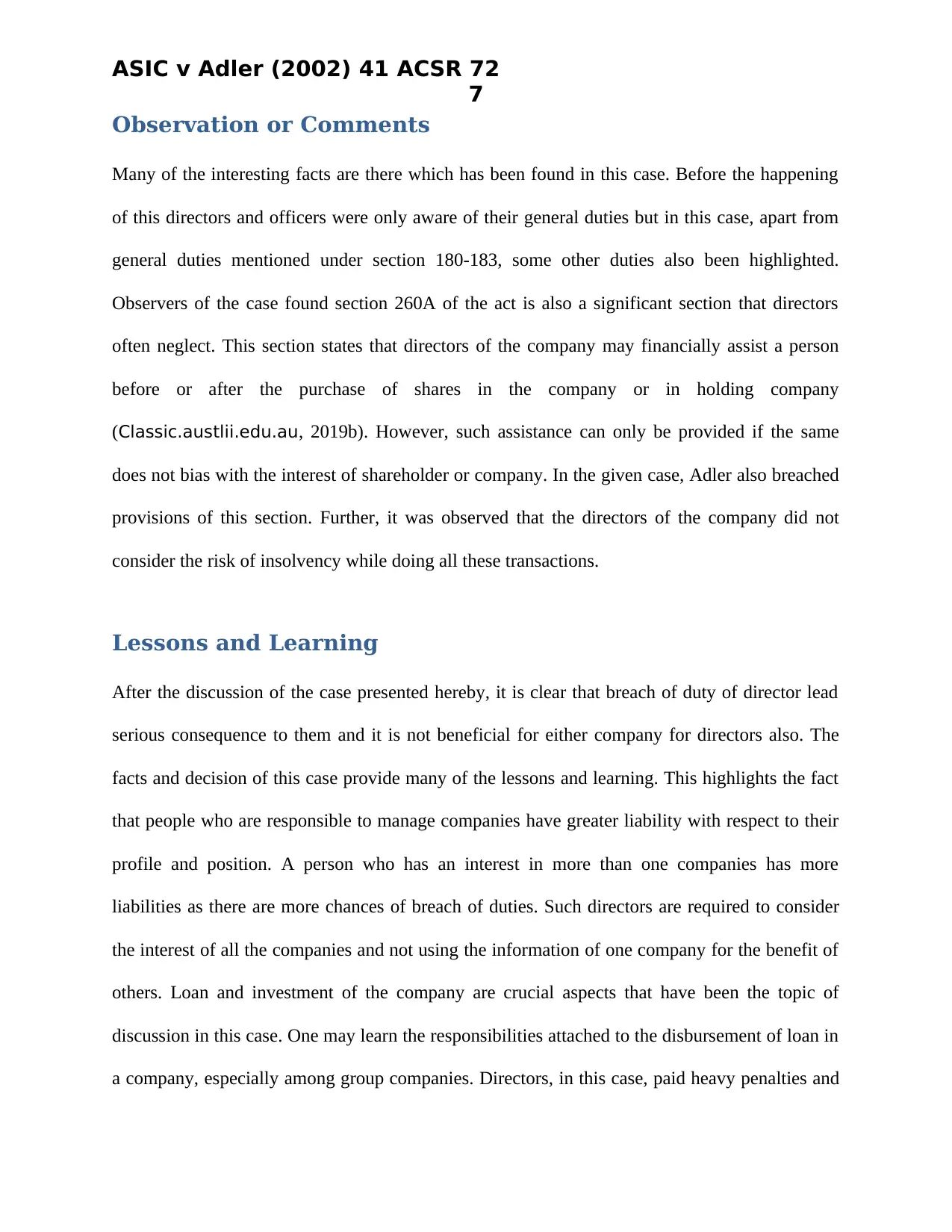
ASIC v Adler (2002) 41 ACSR 72
7
Observation or Comments
Many of the interesting facts are there which has been found in this case. Before the happening
of this directors and officers were only aware of their general duties but in this case, apart from
general duties mentioned under section 180-183, some other duties also been highlighted.
Observers of the case found section 260A of the act is also a significant section that directors
often neglect. This section states that directors of the company may financially assist a person
before or after the purchase of shares in the company or in holding company
(Classic.austlii.edu.au, 2019b). However, such assistance can only be provided if the same
does not bias with the interest of shareholder or company. In the given case, Adler also breached
provisions of this section. Further, it was observed that the directors of the company did not
consider the risk of insolvency while doing all these transactions.
Lessons and Learning
After the discussion of the case presented hereby, it is clear that breach of duty of director lead
serious consequence to them and it is not beneficial for either company for directors also. The
facts and decision of this case provide many of the lessons and learning. This highlights the fact
that people who are responsible to manage companies have greater liability with respect to their
profile and position. A person who has an interest in more than one companies has more
liabilities as there are more chances of breach of duties. Such directors are required to consider
the interest of all the companies and not using the information of one company for the benefit of
others. Loan and investment of the company are crucial aspects that have been the topic of
discussion in this case. One may learn the responsibilities attached to the disbursement of loan in
a company, especially among group companies. Directors, in this case, paid heavy penalties and
7
Observation or Comments
Many of the interesting facts are there which has been found in this case. Before the happening
of this directors and officers were only aware of their general duties but in this case, apart from
general duties mentioned under section 180-183, some other duties also been highlighted.
Observers of the case found section 260A of the act is also a significant section that directors
often neglect. This section states that directors of the company may financially assist a person
before or after the purchase of shares in the company or in holding company
(Classic.austlii.edu.au, 2019b). However, such assistance can only be provided if the same
does not bias with the interest of shareholder or company. In the given case, Adler also breached
provisions of this section. Further, it was observed that the directors of the company did not
consider the risk of insolvency while doing all these transactions.
Lessons and Learning
After the discussion of the case presented hereby, it is clear that breach of duty of director lead
serious consequence to them and it is not beneficial for either company for directors also. The
facts and decision of this case provide many of the lessons and learning. This highlights the fact
that people who are responsible to manage companies have greater liability with respect to their
profile and position. A person who has an interest in more than one companies has more
liabilities as there are more chances of breach of duties. Such directors are required to consider
the interest of all the companies and not using the information of one company for the benefit of
others. Loan and investment of the company are crucial aspects that have been the topic of
discussion in this case. One may learn the responsibilities attached to the disbursement of loan in
a company, especially among group companies. Directors, in this case, paid heavy penalties and
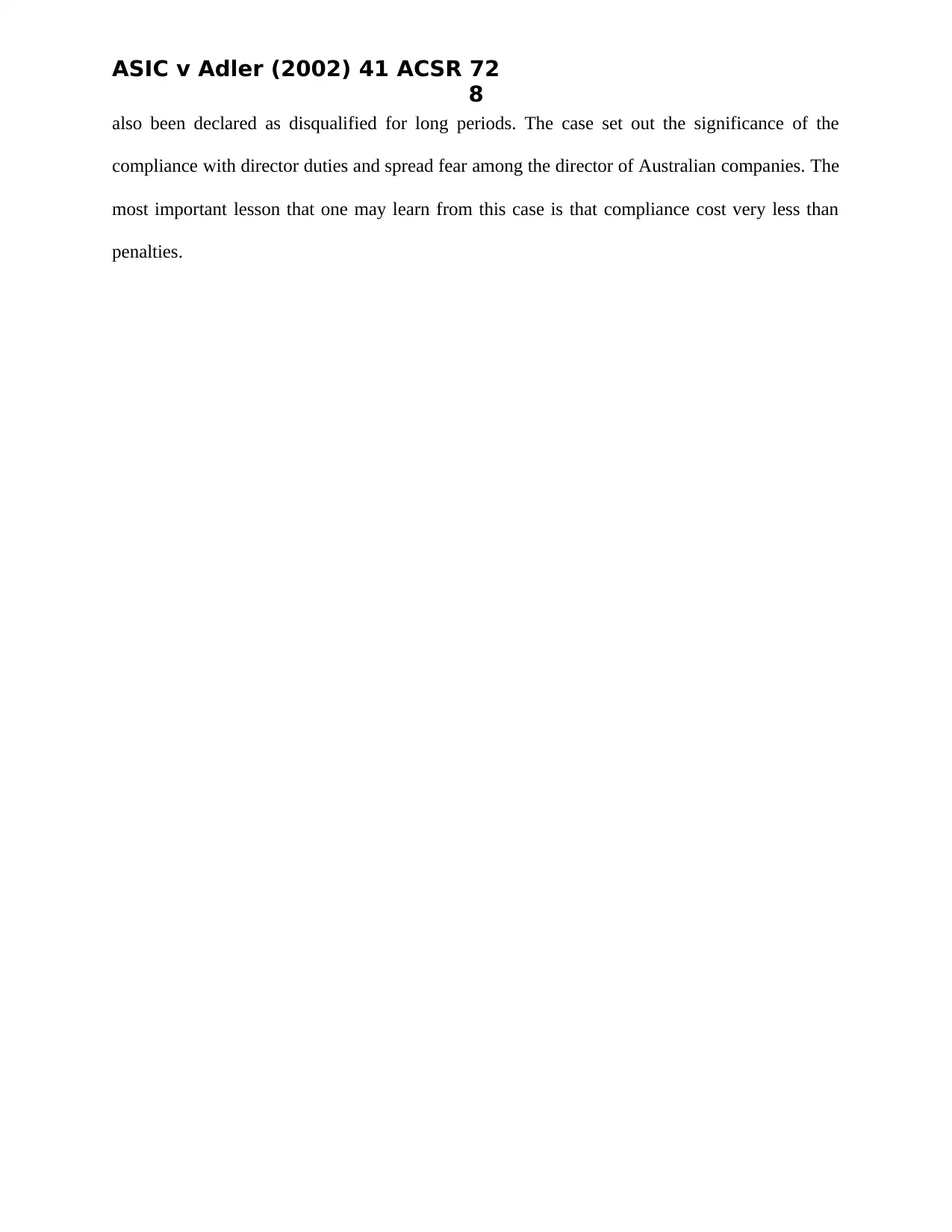
ASIC v Adler (2002) 41 ACSR 72
8
also been declared as disqualified for long periods. The case set out the significance of the
compliance with director duties and spread fear among the director of Australian companies. The
most important lesson that one may learn from this case is that compliance cost very less than
penalties.
8
also been declared as disqualified for long periods. The case set out the significance of the
compliance with director duties and spread fear among the director of Australian companies. The
most important lesson that one may learn from this case is that compliance cost very less than
penalties.
⊘ This is a preview!⊘
Do you want full access?
Subscribe today to unlock all pages.

Trusted by 1+ million students worldwide
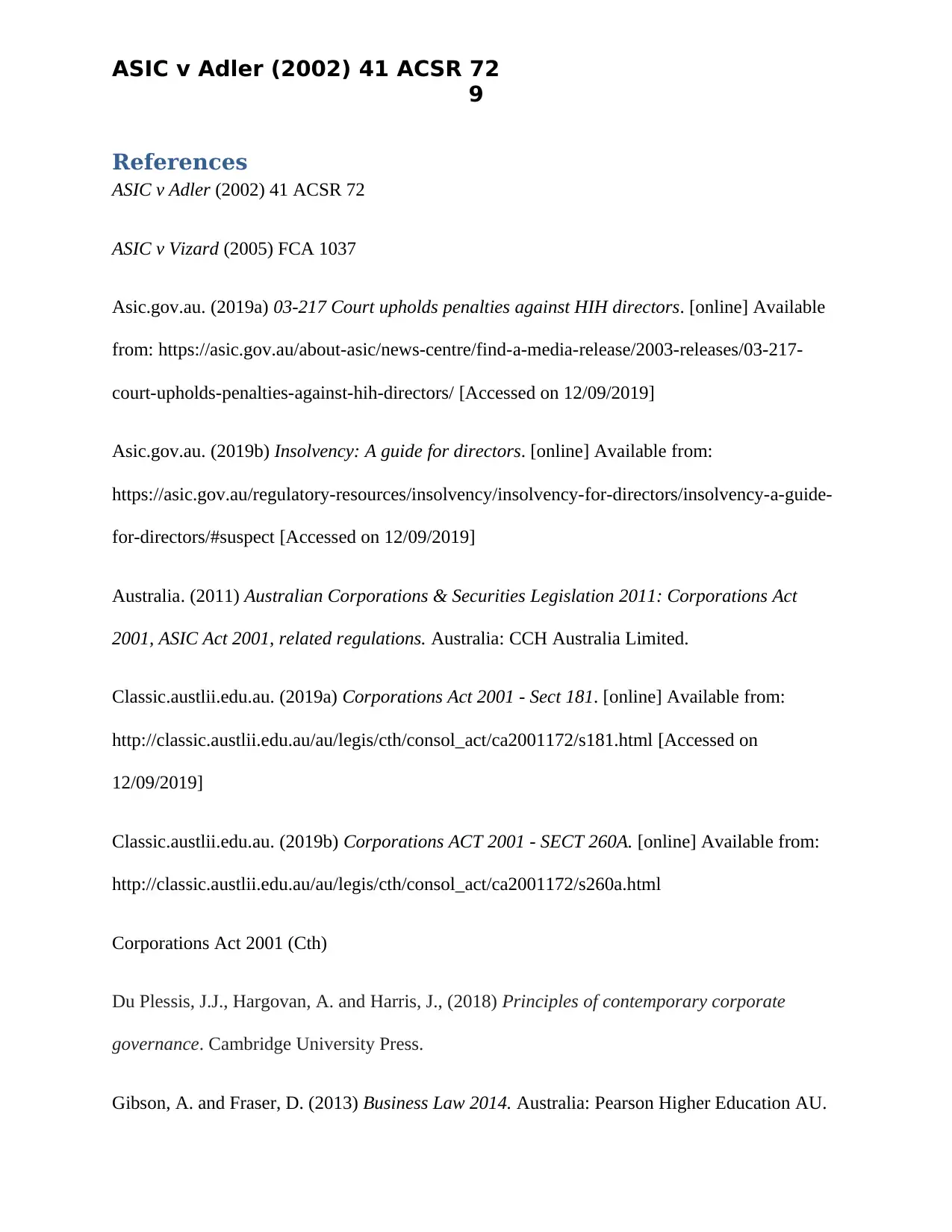
ASIC v Adler (2002) 41 ACSR 72
9
References
ASIC v Adler (2002) 41 ACSR 72
ASIC v Vizard (2005) FCA 1037
Asic.gov.au. (2019a) 03-217 Court upholds penalties against HIH directors. [online] Available
from: https://asic.gov.au/about-asic/news-centre/find-a-media-release/2003-releases/03-217-
court-upholds-penalties-against-hih-directors/ [Accessed on 12/09/2019]
Asic.gov.au. (2019b) Insolvency: A guide for directors. [online] Available from:
https://asic.gov.au/regulatory-resources/insolvency/insolvency-for-directors/insolvency-a-guide-
for-directors/#suspect [Accessed on 12/09/2019]
Australia. (2011) Australian Corporations & Securities Legislation 2011: Corporations Act
2001, ASIC Act 2001, related regulations. Australia: CCH Australia Limited.
Classic.austlii.edu.au. (2019a) Corporations Act 2001 - Sect 181. [online] Available from:
http://classic.austlii.edu.au/au/legis/cth/consol_act/ca2001172/s181.html [Accessed on
12/09/2019]
Classic.austlii.edu.au. (2019b) Corporations ACT 2001 - SECT 260A. [online] Available from:
http://classic.austlii.edu.au/au/legis/cth/consol_act/ca2001172/s260a.html
Corporations Act 2001 (Cth)
Du Plessis, J.J., Hargovan, A. and Harris, J., (2018) Principles of contemporary corporate
governance. Cambridge University Press.
Gibson, A. and Fraser, D. (2013) Business Law 2014. Australia: Pearson Higher Education AU.
9
References
ASIC v Adler (2002) 41 ACSR 72
ASIC v Vizard (2005) FCA 1037
Asic.gov.au. (2019a) 03-217 Court upholds penalties against HIH directors. [online] Available
from: https://asic.gov.au/about-asic/news-centre/find-a-media-release/2003-releases/03-217-
court-upholds-penalties-against-hih-directors/ [Accessed on 12/09/2019]
Asic.gov.au. (2019b) Insolvency: A guide for directors. [online] Available from:
https://asic.gov.au/regulatory-resources/insolvency/insolvency-for-directors/insolvency-a-guide-
for-directors/#suspect [Accessed on 12/09/2019]
Australia. (2011) Australian Corporations & Securities Legislation 2011: Corporations Act
2001, ASIC Act 2001, related regulations. Australia: CCH Australia Limited.
Classic.austlii.edu.au. (2019a) Corporations Act 2001 - Sect 181. [online] Available from:
http://classic.austlii.edu.au/au/legis/cth/consol_act/ca2001172/s181.html [Accessed on
12/09/2019]
Classic.austlii.edu.au. (2019b) Corporations ACT 2001 - SECT 260A. [online] Available from:
http://classic.austlii.edu.au/au/legis/cth/consol_act/ca2001172/s260a.html
Corporations Act 2001 (Cth)
Du Plessis, J.J., Hargovan, A. and Harris, J., (2018) Principles of contemporary corporate
governance. Cambridge University Press.
Gibson, A. and Fraser, D. (2013) Business Law 2014. Australia: Pearson Higher Education AU.
Paraphrase This Document
Need a fresh take? Get an instant paraphrase of this document with our AI Paraphraser
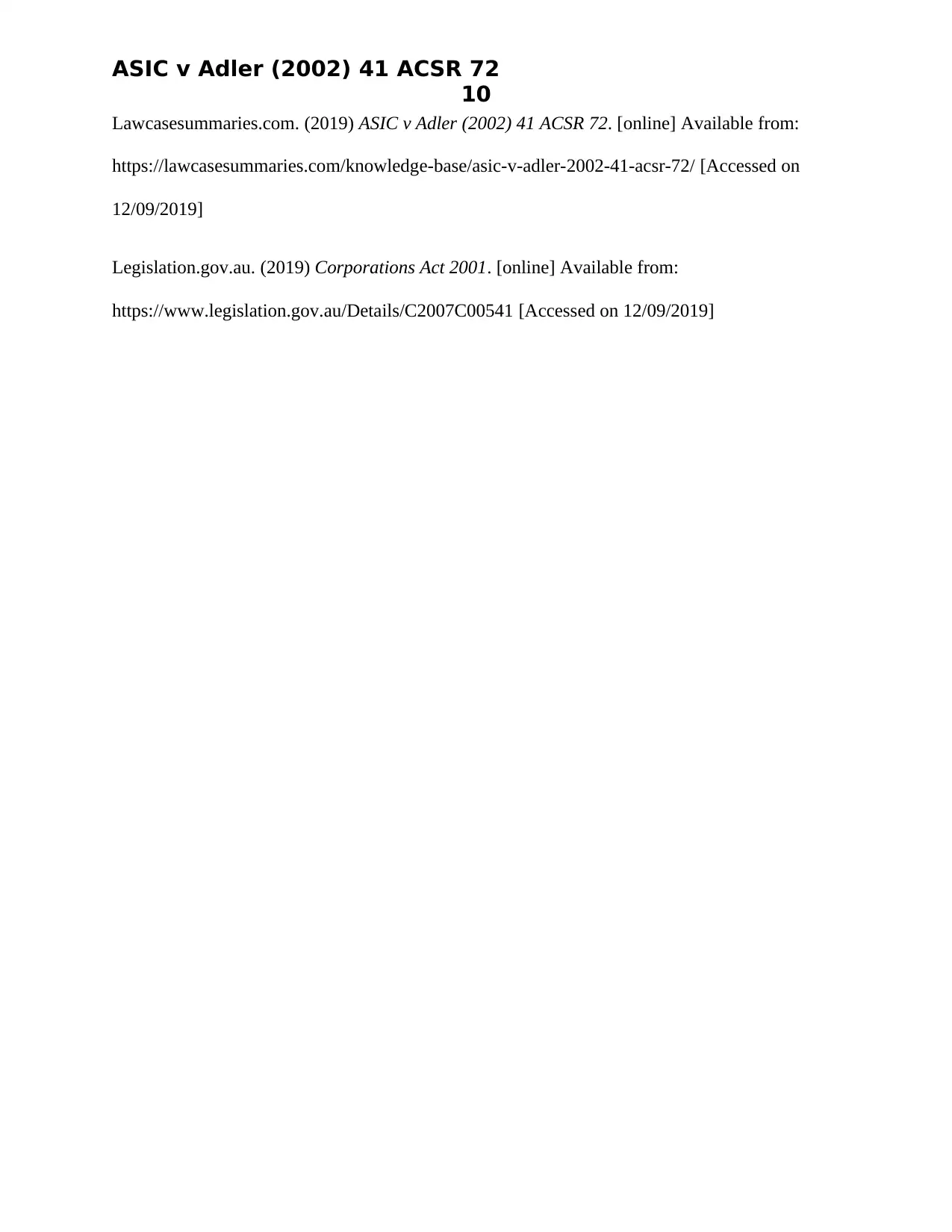
ASIC v Adler (2002) 41 ACSR 72
10
Lawcasesummaries.com. (2019) ASIC v Adler (2002) 41 ACSR 72. [online] Available from:
https://lawcasesummaries.com/knowledge-base/asic-v-adler-2002-41-acsr-72/ [Accessed on
12/09/2019]
Legislation.gov.au. (2019) Corporations Act 2001. [online] Available from:
https://www.legislation.gov.au/Details/C2007C00541 [Accessed on 12/09/2019]
10
Lawcasesummaries.com. (2019) ASIC v Adler (2002) 41 ACSR 72. [online] Available from:
https://lawcasesummaries.com/knowledge-base/asic-v-adler-2002-41-acsr-72/ [Accessed on
12/09/2019]
Legislation.gov.au. (2019) Corporations Act 2001. [online] Available from:
https://www.legislation.gov.au/Details/C2007C00541 [Accessed on 12/09/2019]
1 out of 11
Related Documents
Your All-in-One AI-Powered Toolkit for Academic Success.
+13062052269
info@desklib.com
Available 24*7 on WhatsApp / Email
![[object Object]](/_next/static/media/star-bottom.7253800d.svg)
Unlock your academic potential
Copyright © 2020–2026 A2Z Services. All Rights Reserved. Developed and managed by ZUCOL.



![ASIC v Adler [2002] NSWSC 171: Case Analysis and Legal Implications](/_next/image/?url=https%3A%2F%2Fdesklib.com%2Fmedia%2Fasic-v-adler-breached-directors-duties_page_2.jpg&w=256&q=75)